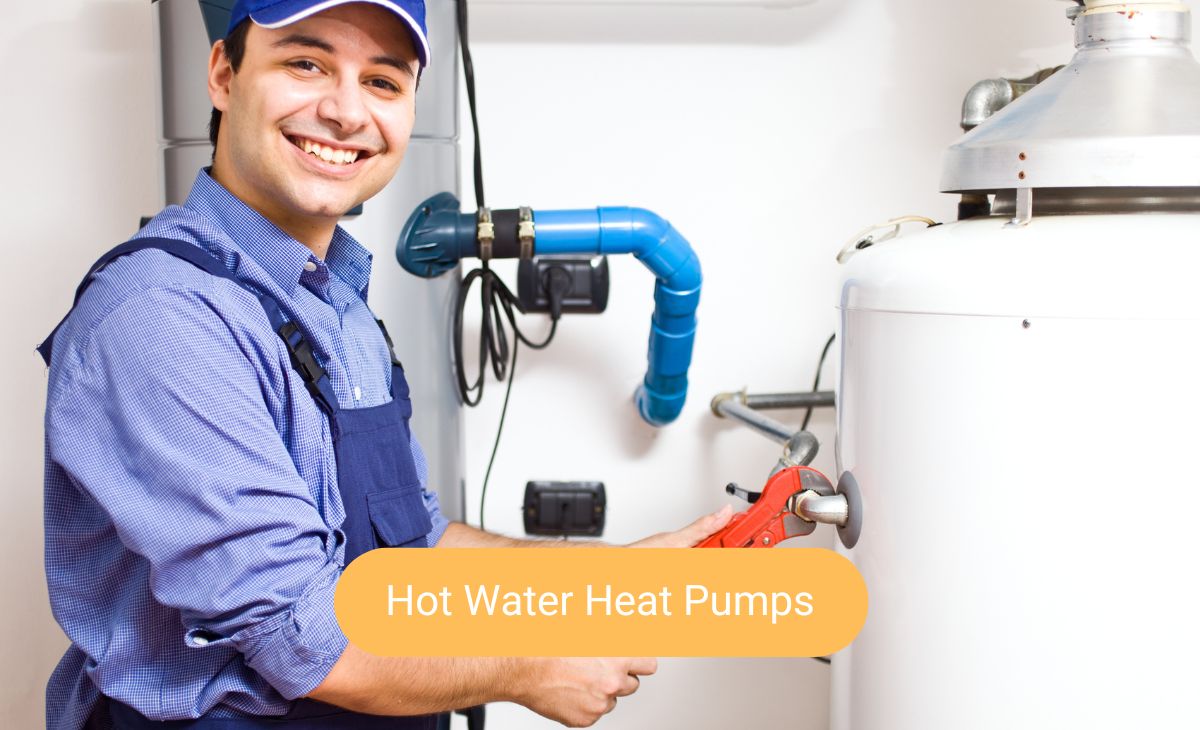Wondering if heat pumps for domestic hot water are right for your home? This guide offers a precise look into how heat pumps can lower your energy bills and reduce carbon emissions while providing reliable hot water. Explore the workings, benefits, and considerations of heat pumps without the jargon, and learn how they compare to conventional heaters to find the best option for your domestic needs.
Key Takeaways
Heat pump water heaters are a versatile and efficient alternative to conventional electric heaters, capable of reducing energy consumption by up to 70% by drawing heat from the air.
Different types of heat pump systems, such as integrated and split systems, cater to diverse home requirements, and the correct size of the heat pump tank should be chosen based on household water usage.
Switching to a heat pump hot water system not only provides significant energy savings and lowers utility bills but also contributes to reducing greenhouse gas emissions, with government incentives supporting the adoption.
Understanding Heat Pumps for Home Hot Water Needs
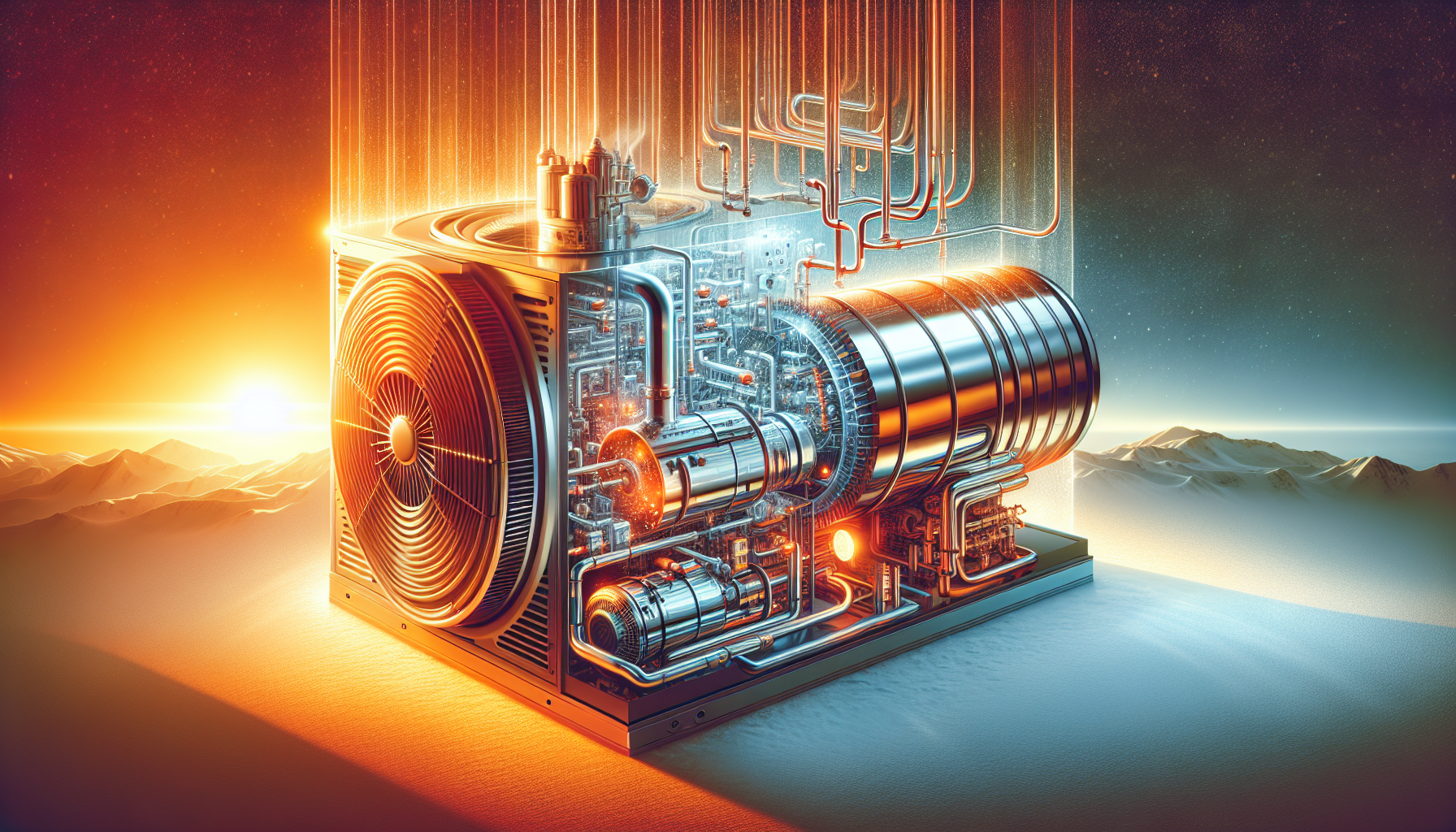
Heat pumps represent a leap towards energy-efficient living. These ingenious devices are not just for regulating your home’s temperature; they’ve revolutionized the way we heat water. Imagine a system that can draw heat from the air, like magic, and use it to warm your water with up to 70% less energy consumption than conventional electric hot water systems. This is no sleight of hand but the reality of hot water heat pumps, also known as heat pump water heaters.
The true beauty of heat pumps lies in their versatility and efficiency. Whether you’re retrofitting an existing hot water system or installing a brand-new setup, heat pumps can accommodate. They work tirelessly to provide hot water, leveraging the ambient air as their heat source, all while being kind to both your wallet and the planet.
The Science Behind Heat Pump Technology
Heat pump technology is akin to a reverse refrigerator. Instead of expelling heat to keep the insides cool, it captures heat from the outside air and funnels it into your water tank. This marvel of engineering involves a heat pump compressor, which amplifies the extracted heat to a higher temperature before gently coaxing it into your water.
The result? A significant reduction in the electricity used and carbon emissions released into the atmosphere compared to conventional heating systems. It’s a win-win situation where you enjoy the cozy comfort of hot water without the high costs and environmental impact.
Comparing Heat Pumps to Conventional Electric Water Heaters
When it comes to efficiency, heat pumps are the heavyweights, tipping the scales at three times the efficiency of their conventional electric counterparts. This is because, unlike traditional water heaters that generate heat directly, heat pumps simply move existing heat from one place to another.
The difference in operational methods equates to lower energy use and, consequently, lower utility bills. With a heat pump, you’re not just heating water; you’re nurturing an energy-efficient home environment.
Types of Heat Pump Hot Water Systems
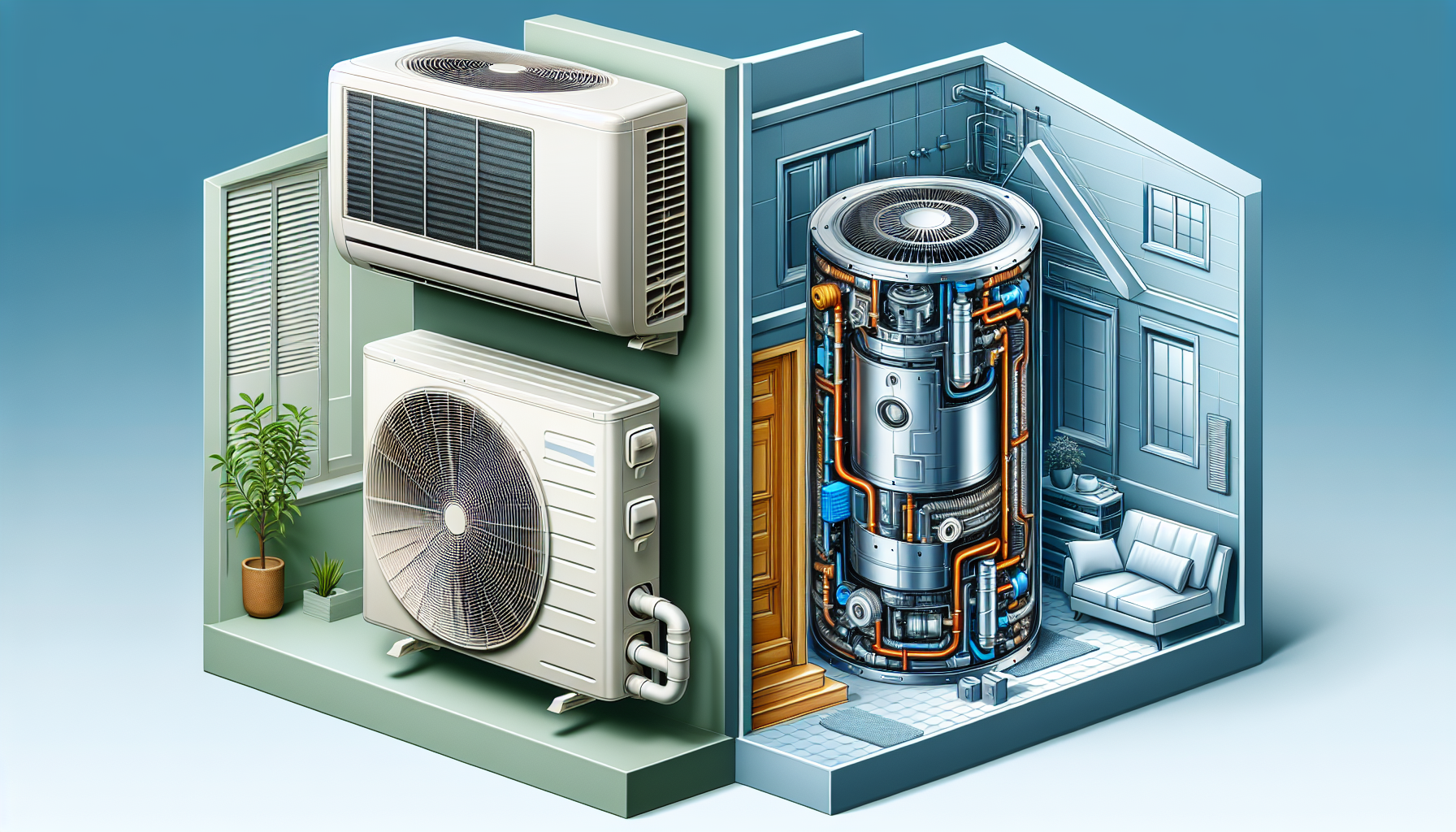
Heat pump water heaters come in different flavors to suit various tastes and home configurations. You might encounter integrated units, where the heat pump components snuggle up with the water tank in one compact design. On the other hand, split systems play the separation game, dividing the compressor and the tank for a more versatile arrangement.
Choosing between these systems is like selecting the perfect outfit for your home. Integrated systems are akin to a one-piece dress – simple and straightforward. Split systems, however, offer the flexibility of mix-and-match with heating and cooling functions, making them adaptable to your home’s unique needs.
Split System Air Conditioner vs. Integrated Heat Pump Systems
The split system air conditioner is the transformer of the heat pump world. It adapts to your space, with its separate components offering both heating and cooling capabilities for year-round comfort. Think of it as having the freedom to place a speaker in every corner of your house for the perfect sound.
On the flip side, integrated heat pump systems are more like a boombox – compact and easy to place. They may not have the same flexibility as their split system counterparts, but they make up for it with simplicity and ease of installation. The choice ultimately depends on your home’s layout and your personal preferences.
Selecting the Right Size Heat Pump Hot Water Tank
Choosing the right size for your heat pump hot water tank is like picking the right-sized battery for your gadget – too small and it won’t last, too large and you’re wasting energy. It’s crucial to find that Goldilocks zone where the tank is just right for your household’s hot water needs without any unnecessary energy expenditure.
Factors like the number of bathrooms, daily routines, and even future changes in household size should influence your decision. A good rule of thumb is to estimate about 50 liters of hot water per person per day, then add a 50% buffer for those days when you might need a little extra.
The Benefits of Switching to a Heat Pump Hot Water System
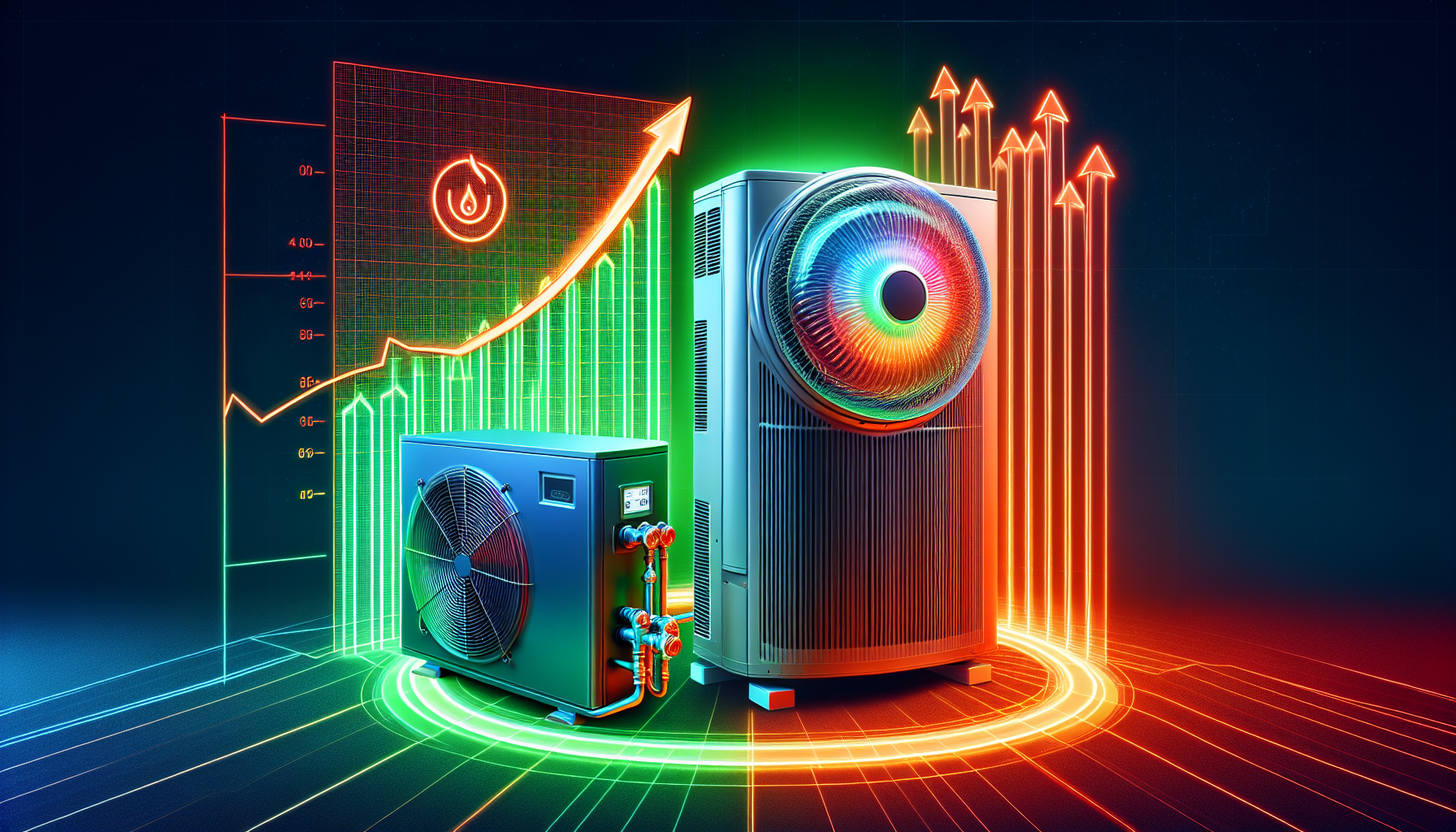
The switch to an electric hot water system, specifically a heat pump hot water system, is a leap toward sustainability and savings. Think of it as trading in your old gas-guzzler for a sleek electric vehicle. Not only do these systems use 3 to 4 times less energy than traditional water heaters, but they also pave the way for a greener future by reducing your home’s carbon footprint. An electric storage water heater is an excellent choice for those looking to make this eco-friendly switch.
An average household can pocket an impressive $372 to $515 annually by transitioning from a gas storage water heater to a high-efficiency heat pump. But the benefits don’t stop at your wallet; you’ll also be contributing to a significant reduction in carbon emissions over the lifespan of your system.
Cost Savings in the Long Run
While the initial investment in a heat pump water heater might raise an eyebrow, the long-term savings will definitely make you smile. Over time, the high upfront costs are easily offset by the lower operating expenses. Picture this: a heat pump system that pays for itself and then some, thanks to its energy-efficient operation.
By opting for a heat pump over traditional hot water systems, you’re choosing an energy-efficient option that can lead to substantial savings on energy bills over extended periods. It’s a smart move that keeps giving back to your budget year after year.
Eco-Friendly Heating: Minimizing Greenhouse Gas Emissions
Heat pump hot water systems are not just about saving money; they’re about saving the planet too. By harnessing the surrounding air to heat water, these systems significantly cut down on greenhouse gas emissions compared to generating heat directly. This eco-friendly approach aligns with the growing global commitment to reducing our carbon footprint.
Furthermore, government incentives such as small-scale technology certificates (STCs) are encouraging the uptake of heat pump systems by rewarding their lower power usage and consequent emissions reduction. By integrating solar panels, the environmental benefits are even more pronounced, offering a pathway to a carbon-neutral home.
Installation Insights for Heat Pump Hot Water Systems
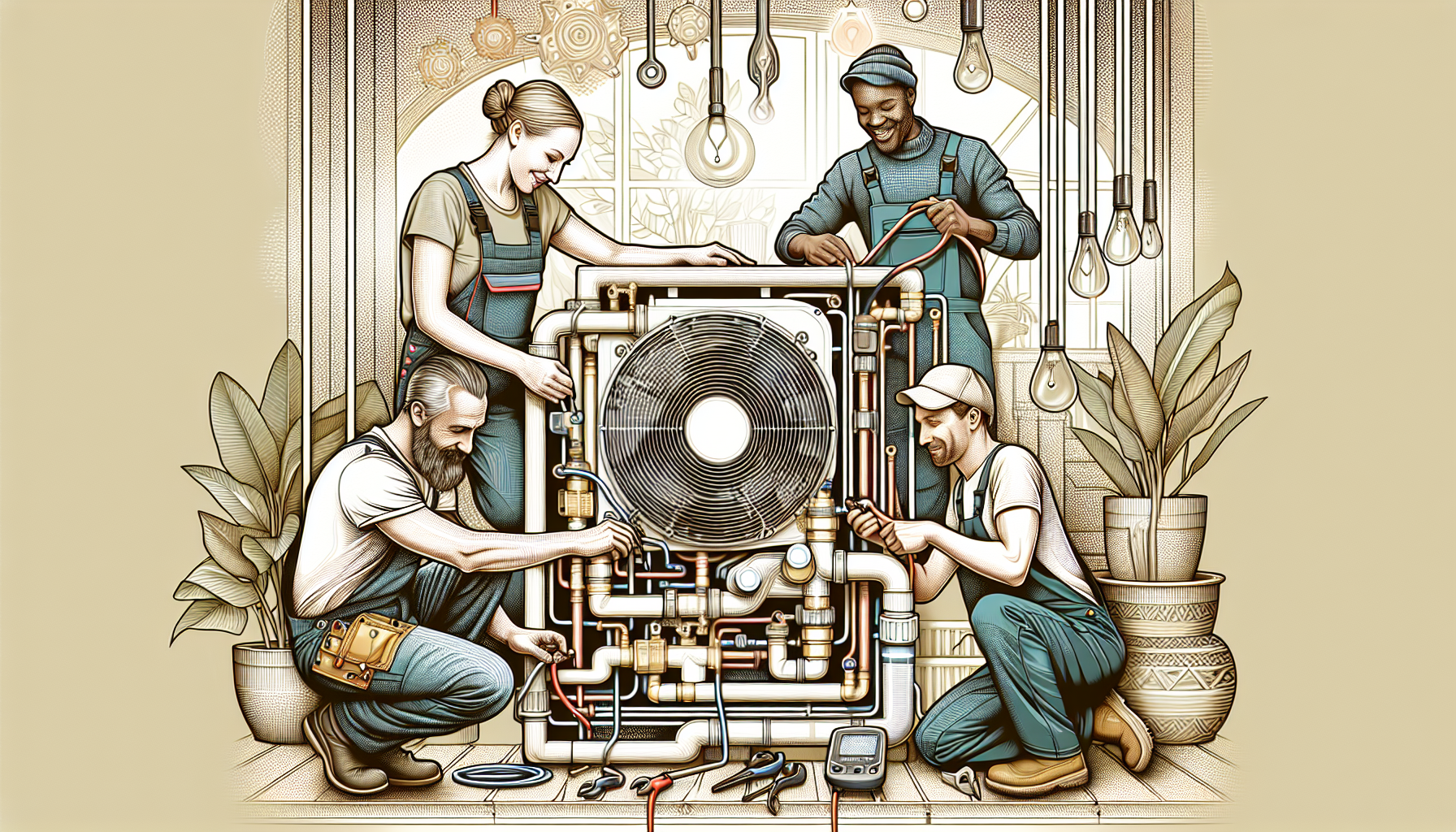
Proper installation is the backbone of a heat pump hot water system’s performance and efficiency. It’s a task best left to professionals who can ensure that your system is optimally set up for your specific needs. Think of it as having a tailor custom-fit your suit – it just works better.
Enlisting the expertise of a qualified electrician and plumber is essential. They’ll make sure that your heat pump is not only installed correctly but also configured to provide maximum benefits for years to come. It’s an investment in peace of mind and performance.
Professional Installation: Ensuring Optimal Efficiency
A professional installation by a qualified plumbing and heating contractor ensures that your heat pump system operates at peak efficiency. It’s like having a pit crew fine-tune your race car; every detail must be just right for the best performance.
Working with a professional means you’ll choose a system that perfectly meets your hot water needs without wasting energy or money. They’ll navigate the complexities of installation, leaving you with a seamlessly integrated system.
Understanding Installation Costs
The cost of installing a heat pump hot water system varies, much like the price of a renovation depends on the size and scope of the project. Expect to invest between $3,000 to $5,000 for a system that’s tailored to your home’s specific needs. Installation costs can be influenced by factors such as the system’s capacity and the electricity tariffs it’s connected to. It’s also wise to factor in additional costs like insulating hot water pipes to minimize heat loss. To get a clear picture of what you might spend, consulting a professional energy consultant is recommended. They can provide an accurate estimate and help you find the most suitable system for your budget.
Maintenance Tips for Your Heat Pump System
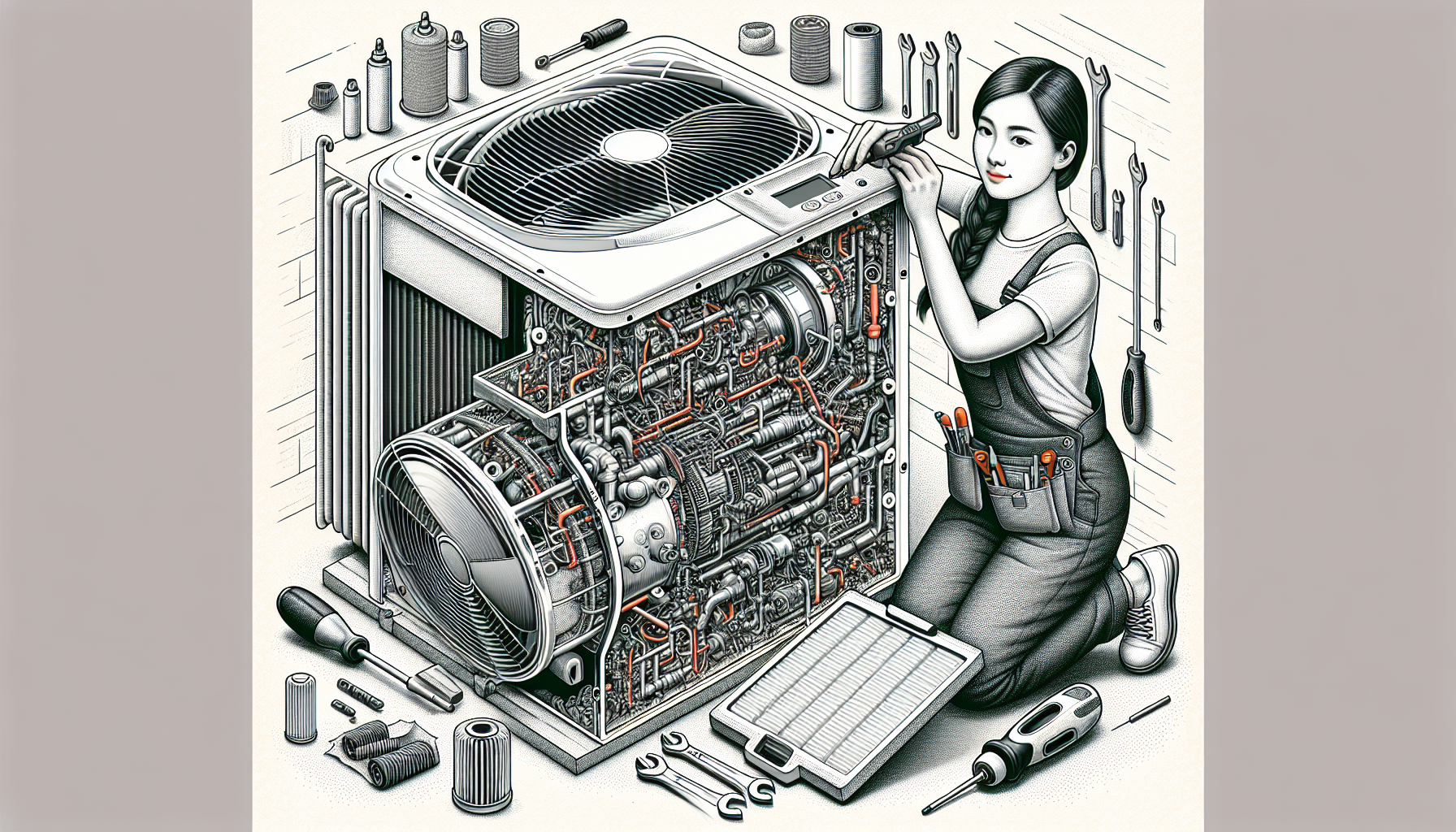
Maintaining your heat pump system is the key to sustaining its longevity and efficiency. Regular maintenance, akin to taking your car for servicing, can greatly extend the life of your water heater and keep it running smoothly. It’s the little things, like annual servicing and checking refrigerant levels, that make all the difference.
Professional inspections should be scheduled annually or bi-annually to ensure everything is in working order. Specific maintenance actions include:
Monitoring for leaks
Cleaning coils
Testing pressure relief valves
Keeping the area around the pump clear
It’s about staying ahead of potential issues and ensuring your system keeps heating water without a hitch.
Regular Servicing and Upkeep
Like any well-oiled machine, heat pump systems require regular check-ups to stay in top condition. Professional maintenance checks every three to four years are recommended to ensure your system continues to operate efficiently.
For those who prefer to be hands-on, your heat pump system’s owner’s manual is your go-to resource for specific maintenance recommendations. It’s your guide to DIY care that keeps your system humming along.
Troubleshooting Common Heat Pump Issues
Even the most reliable systems can encounter issues, and heat pumps are no exception. Regular troubleshooting can help identify and resolve common problems before they escalate. For instance, if your heat pump compressor is making a noise, it’s likely just the low-level humming of normal operation, but it’s always best to be sure.
By keeping an eye on your system and addressing small concerns promptly, you can avoid larger issues down the line. It’s about proactive maintenance that ensures your heat pump continues to provide hot water efficiently and effectively.
Maximizing Heat Pump Performance in Various Climates
Heat pumps are not one-size-fits-all solutions; their performance can be tailored to the climate you live in. In warmer climates, they’re incredibly efficient, making the most of the available ambient heat.
However, even in cooler environments, heat pumps can still perform admirably. It’s all about understanding the technology and how to adapt it to your specific climate for optimal efficiency and comfort.
Optimizing Heat Pumps for Warmer Climates
Warmer climates are like a playground for heat pumps. They thrive in these conditions, where the higher air temperatures provide ideal conditions for heat transfer.
In tropical settings, the efficiency of heat pumps is further enhanced, leading to decreased operational expenses and potentially smaller system components. It’s about leveraging the climate to your advantage for the best heating results.
Adapting Heat Pump Use in Cooler Environments
Don’t let cooler climates discourage you; heat pumps can still deliver. Advanced technologies enable these systems to maintain efficiency even as the mercury drops.
Ground-source heat pumps, in particular, excel in colder conditions, maintaining higher efficiency levels than air-source models under similar circumstances. To boost their performance in these environments, consider pairing your heat pump with solar panels for an extra warmth boost.
Enhancing Your Heat Pump with Solar Energy
Merging heat pumps with solar energy is like adding a turbocharger to an engine. The result is a system that’s not just efficient but supercharged with energy efficiency and sustainability.
In cooler climates, solar panels can provide the extra push needed to power your heat pump, leading to even greater cost savings and reduced carbon emissions. It’s an eco-friendly synergy that maximizes the potential of both technologies.
Summary
As we’ve navigated the world of heat pumps, it’s clear that they are more than just a means to heat water; they represent a shift towards a more sustainable and cost-effective way of living. Whether you’re enticed by the long-term savings, the environmental benefits, or the ingenious technology, there’s no denying the impact a heat pump hot water system can have on your home and the planet.
Embracing heat pump technology is a smart move for any homeowner looking to reduce their carbon footprint and embrace energy efficiency. With the right system, professional installation, and regular maintenance, you can enjoy the comfort of hot water without the worry of inflated energy bills or environmental harm. Let this guide be your roadmap to a greener, more efficient home.
Frequently Asked Questions
How much can I expect to save on energy bills with a heat pump hot water system?
Switching from a conventional gas water heater to a high-efficiency heat pump can save an average 3 person home between $372 to $515 per year on energy bills. So, it’s definitely worth considering!
Are heat pumps a good option in cooler climates?
Yes, heat pumps can be effective in cooler climates, especially advanced models that maintain efficiency in lower temperatures and can be supplemented with solar panels for better performance.
What are the environmental benefits of using a heat pump for hot water?
Using a heat pump for hot water provides environmental benefits by using less energy and producing fewer greenhouse gas emissions, ultimately contributing to a smaller carbon footprint.
How often do heat pump systems need professional maintenance?
You should have your heat pump system professionally checked every three to four years to maintain its efficiency. This helps ensure it continues to operate smoothly.
Can I connect my heat pump hot water system to my existing solar panels?
Yes, you can connect your heat pump hot water system to your existing solar panels using a smart controller to maximize the efficiency of your system.
